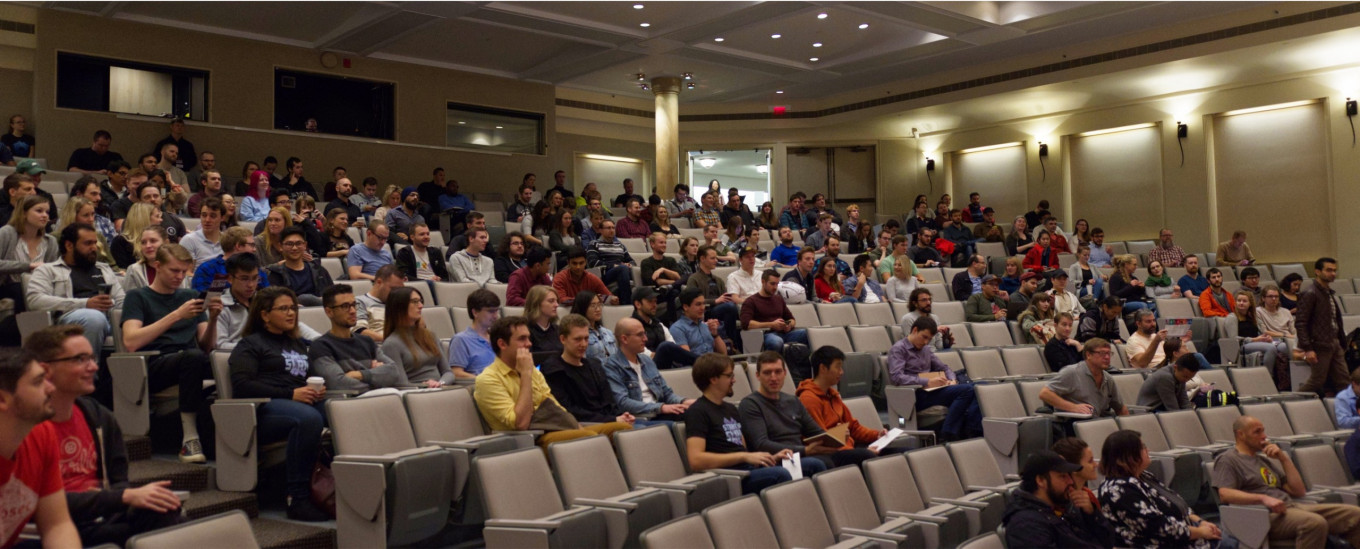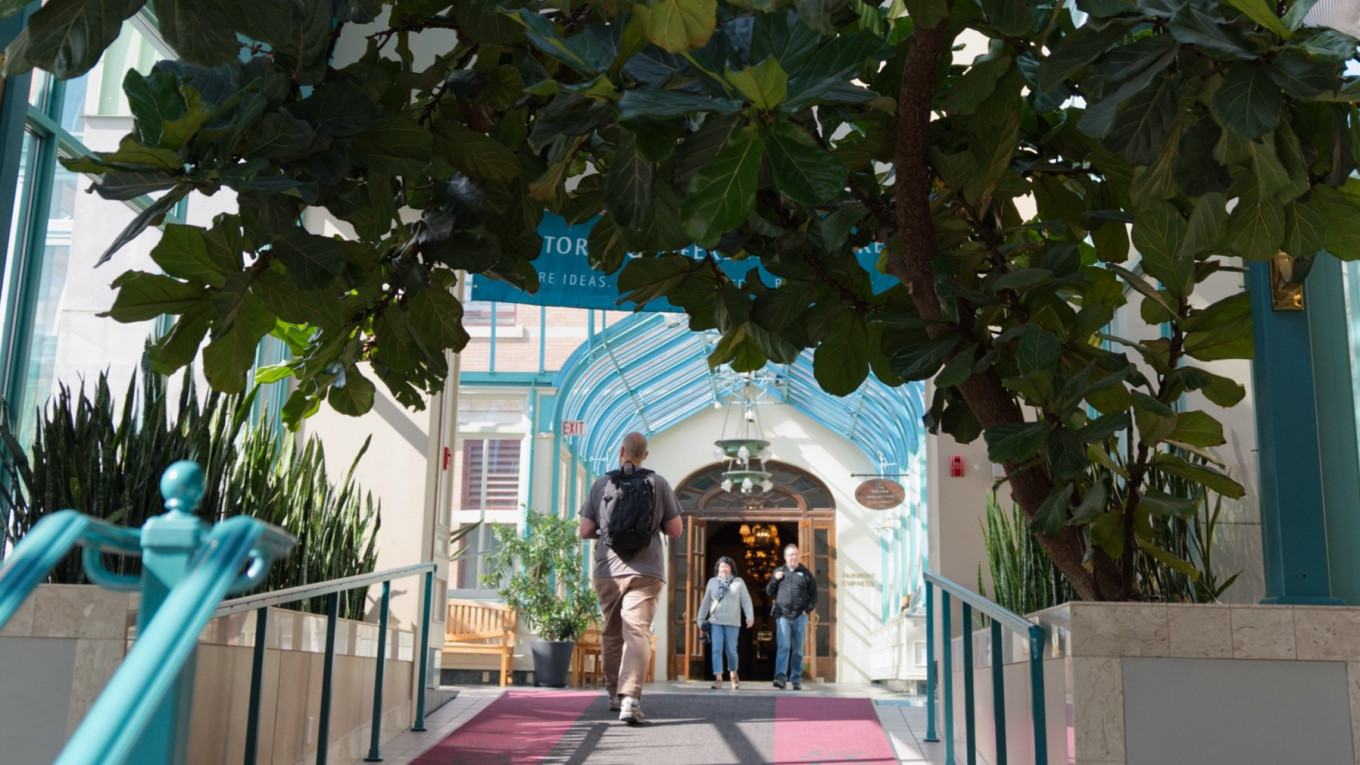Have an idea you want to bring to fruition or want to talk to a mentor about how to get started in tech? Talk to investors, founders, product managers, and startup legal experts one-on-one about how to found a startup by booking a 10 minute session at registration. Space is limited, so book early to take advantage! Registration will open at 8:30 am on Sept 28.
KEYNOTE PRESENTATION
$1,000,000 Experiments: How To Think Big About Impact And Scale
Fundamentals

Spencer McEwan
Whether you are making last minute changes to an assignment or putting in a quick fix for a user-impacting bug, having an automated test suite helps maintain confidence in the code you’re putting into the world. In this session, we will cover the basics of automated testing, explore strategies for test driven development, and how to incor-porate automated testing into your development life cycle. No matter how big or small your code base, your future self will be grateful!

Rebeca Espirito Santo & Corrie Tanner
Looking to land a job as soon as you graduate? Looking to land your first co-op? You’ll likely need a good resume to get the interview! Join us for tips on how to better leverage your resume as a marketing tool.
During this interactive workshop, we will walk you through the resume writing process and explore how to obtain the experience and skills you need to land that interview. We will review the basics (formatting, dos and don’ts, etc.) with a strong focus on content. We will share tips on how to enrich and best present your experience and skill-set on your resume. We will also take a step back and discuss how to acquire the skills and experience needed to strengthen your resume. Just like any other visual communication piece, aesthetic appeal and functional format are important, however, quality content is your foundation.
It would be great if you could bring your current resume on a laptop or printed. If you don’t have one yet, no worries, you will still be able to partake and take a lot away from our time together.

Nathaniel Woodthorpe
Did you know that with a few pre-requisite skills, you can help build the software you love and use every day? Atom, Rails, Tensorflow, VLC, Audacity, and Linux are all examples of projects that host their source code online for free. These projects are all accepting contributions from anyone, no matter your background, education level, or geographic location.
In this talk we will learn how to contribute to open source software. We’ll spend time learning how to use Git and GitHub at an introductory level and work through an example of contributing to a real production application, GitHub Classroom.
Some experience developing software at any level will help, but is not required.
Advanced Development

Nathan Calvank
In this session, I will explore the past, present, and future of JavaScript language internals. In an attempt to bridge the gap between those who may have written-off past versions of the language, I will highlight the patterns that have been deprecated, the latest best-practices, and the lesser-known language features. The topics covered will include the updates to asynchronous programming, latest scoping behaviour, proper tail calls, developer tooling, and much more. This is a lecture-style presentation, but any source code discussed will be available for download.
An open mind and (preferably) previous experience with JavaScript. There will be some assumption of knowledge around asynchronous programming (notably callbacks), object-oriented programming, and functional programming (notably recursion).

Aurora Walker
At Bambora North America, we’ve got a 20 year history of code that revolves around a central monolithic system. Since the general public consensus is that monoliths are bad, we started to swing hard in the opposite direction, building Microservices for all the things. But once we embarked on this journey, we started to recognize some key questions we forgot to ask ourselves. When you split a service, what way do you split it? How strongly do you really feel about code duplication across projects? How big is our AWS bill going to get? And, perhaps more importantly, is there such a thing as too many Microservices? Aurora will share with you what she and her team have learned, and try and prepare you with smart questions you can ask yourself if you are faced with working on a Microservices architecture.
Some experience or understanding of building and deploying web services is an advantage, but not a requirement.

Chris Foster
Component-driven development is a new, modern development methodology that is being embraced by companies like Github, Dropbox, and AirBNB to develop high quality user experiences for the web. In this talk you’ll learn what component-driven development is, the history behind it, and the benefits it can bring to you! We will explore how to tangibly use this methodology with Storybook, an open source tool for developing UI components, and check out some key pieces of the rich plugin ecosystem surrounding Storybook.
You’ll learn how, with component-driven development, your frontend development team no longer becomes blocked by your backend development team. You will see how you can benefit from the self-documenting nature of Stories, explore how Stories can be integrated with unit tests, and use Stories to add easy visual regression checks to your app. This tooling will even enable better iteration and communication with the designers on your team.
You’ll get the most out of this talk if you are familiar with web development basics using a library like React, Vue, or Angular.
Product & Design

Mike Apted
More startups fail from a lack of customers than from a failure of product development. So why have we had many methodologies for addressing developing software, going back at least to the sixties, and comparatively few for finding people who will pay to use it?
This session discusses processes for discovering and validating your customers, market, and solution. It draws from the works of leaders like Steve Blank and Eric Ries, the culture and processes of Amazon itself, and the presenter’s personal experience. Areas of focus include customer discovery, customer interviews (pitfalls, good/bad questions), customer validation, understanding markets and tactical approaches and tools.

Liv MacIntosh
This workshop will open with an explanation of what product design evaluation is and how it can benefit anyone who contributes to building a product During the second half, we apply these techniques by evaluating websites using your new skills. You will be surprised at what you can do with the right parameters!

Ryan Stinson
Get a glimpse into the process of how Dyspatch created a user-focused product by understanding our current and prospective users, developing cross-team empathy, and incrementally delivering value through feedback and iteration.
Entrepreneurship

Iain Duncan
Private equity growth investments and acquisitions are becoming increasingly common as a funding or exit stage between venture capital and public offerings. Buyers have priorities and strategies that are often very surprising for technical founders. Understanding buyers and being prepared for the Technical Due Diligence process can make a major difference to your company’s success and valuation when you reach this stage.
But for real success, preparation needs to start years in advance! A Technical Due Diligence includes detailed looks at software architecture, infrastructure, the software development process, source code, testing, DevOps, product design, customer support, security, legal issues with open source usage, and more. In this lecture Ian will go through the process of a diligence, explaining what funds are looking for and why, and what they consider red flags or strong opportunities.
As a consultant at Crosslake Tech, Iain Duncan has conducted 25+ technical due diligences for private equity firms. He draws on Crosslake’s experience on over 1000 acquisitions.

Tessa McLoughlin
Tessa is the Founder and Director of KWENCH, a full-service work and culture club for creative, ambitious thinkers and doers who seek more. KWENCH was conceived and built out of Tessa’s desire to create a multi-functional space that facilitates happiness by fostering a balance of 6 things: Knowledge, Wellness, Experiences, Novelty, Curiosity, and Connection.
This September Tessa and her incredible team will open the doors to their new purpose-built 25,000 sqft club with the aim of forever changing what people seek in a workspace.
Join Tessa as she candidly shares her journey, with all the wins and disappointments, challenges and learnings.





















